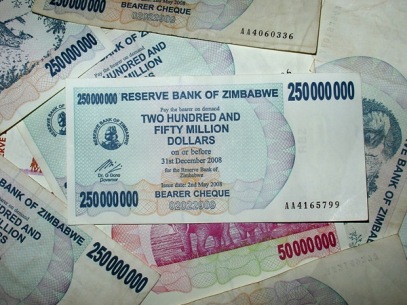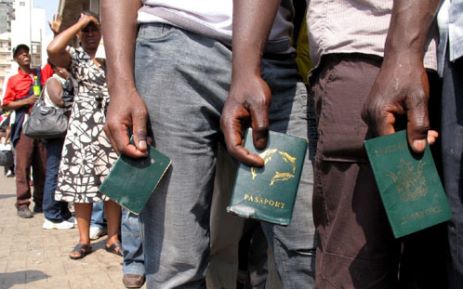For many, leaving Zimbabwe to settle elsewhere is both exciting and harrowing. As a Zimbabwean living in England, I have for a while wanted to share my thoughts on some of the more apposite issues that face Zimbabweans in the diaspora. I accept that we may have chosen different paths in different countries and all left under different circumstances. However, it is no coincidence that certain issues always come to the fore when breaking bread with fellow compatriots around the world.
I, like many Zimbabweans I assume, left my home for reasons far beyond my control. My reasons were personal. I left because, at the time, I wanted to be elsewhere, to explore my options more. My view then, and still, is that in Zimbabwe there is a dearth of institutions to support some of our aspirations. Perhaps, like my older siblings and many other Zimbabweans, I would have left even if the situation had remained as it was prior to the events that led to the use of the bearer cheque and the near-collapse of the Zimbabwean economy. The only difference now, unlike previous generations, is that the prospect of returning home after a stint abroad – to study, save, gain invaluable work experience etc – is becoming less and less attractive.
Alienation as a deterrent
As a white Zimbabwean, my identity and general feelings towards where I belong, or more pertinently where I feel welcome, have been put to the test a thousand times over the past 15 years. Particularly, since the poorly implemented, albeit necessary, land redistribution programme which escalated uncontrollably at the turn of the century. From the very beginning, when the redistribution of land was often violent in nature, I felt a tremendous amount of alienation that emanated from the top. I was often left feeling unwelcome, or experiencing situations that certainly made me realise I was not welcome. It was during this time that my quest of trying to understand, or come to terms with, where I truly belonged began.
I am neither naïve, ignorant nor oblivious to the fact that the effects of colonialism have contributed to this alienation. This alienation is something that I, and white Zimbabweans for generations to come, have to live with and accept. For the many Zimbabweans who experienced the racism and segregation first hand prior to independence, feelings of discontent towards “the White man” are understandably still harboured. I have come to understand that these negative sentiments are often not personal or specifically directed at me. I have also fully embraced being a post-colonial child, a child of the “born free” era. However, the alienation is difficult to live with and I believe it starts to affect the psyche of how white Zimbabweans view themselves in terms of their identity. With that and in pursuit of better opportunities, I left.
My sense of alienation was compounded the day I arrived on English soil where I was immediately (in a non-offensive way) made to feel Zimbabwean. Naturally, amongst other things, my accent is different. I was brought up on a small farm in Madziwa. At that very moment, my home could not have been further away.
I am a foreigner here and written off as the descendant of a colonialist back home.
Our “other” lives
We are individuals before we are Zimbabwean, and our loyalty is allied to the self before the other. Once the self is taken care of, there also needs to be a reciprocal predisposition between the individual and that which one is being loyal to. No individual, in my opinion, would be loyal to the Republic’s cause if it meant their wife and children would go starving or if they weren’t afforded a certain level of comfort in terms of security, stability, prospect for growth, an accommodating functional society and financial capabilities to circumvent the overbearing nature of the daily challenges we are faced with.
Due to a number of reasons, many Zimbabweans have left only to discover and build a very successful life of their own with little in the way of help or drawing on their network of friends and family. The realisation that there is a life outside of Zimbabwe does not come overnight and is often in the face of adversity and tremendous sacrifice. Nonetheless, fantastic success stories abound about our brothers, sisters, cousins, friends, and family friends who have accomplished a lot. People who have made a real go at starting afresh and creating a life of their own.
The decision to up sticks and return home after years of building a new life – which often involves unsettling a young family – will not be without exhaustive deliberation as to the current political, economic and social environment. The prospects don’t look promising.
To go back home, or not to go back home? That is the question
Perhaps the greatest tragedy of the last two decades is the splitting up of families and friends. Both my siblings and I flew the coop. We are now on three different continents. We are all missing out on irreplaceable family time, and resultant experiences, which was such a big part of our upbringing.
Upon our decision to leave Zimbabwe, there was a condition precedent strongly enforced by my other half. The condition was that I agree to return home the day we decided to have children so that we could be around family as, at the end of the day, family is everything. The prospect of raising our children away from the comfort of what we remember growing up, and in the absence of key family figureheads, was unimaginable.
But then there is the realisation that Zimbabwe is not the same as it was when I grew up and the political landscape is modestly unpredictable.
What really throws the cat amongst the pigeons is hearing how so many more Zimbabweans, who had stuck around when many left, have decided to leave.
But today I am left questioning what is most important. Is it the future of my own family and children, or is it being able to bring them up around their relatives and in their home country? The realisation that if they are brought up in England they will lose their ties to the country that has given me so much is difficult to accept. To make the decision to never return is to not only accept that I will see my parents age over Facetime, but it is also to deprive my children of getting to know their roots. Yet going back increasingly seems unlikely.
A genuine dilemma indeed.
Richard Francis





Reblogged this on Pragmatic Realism.
LikeLike
You are the realest Richie! That you can write of your experience as a White Zimbabwean- an experience many have been led to believe would be nothing like the Black one- and yet it reads like you just explained my (and most others’) sentiments too- is phenomenal. Thanks Brother, and I wish you all the necessary clarity from here on!
LikeLike
Is visiting home not an option?
LikeLike
Hi Richard
I have posted something similar to your post in the past, and like most Zimbabweans who live in foreign climes, this need to return home has been a constant consideration for 15 odd years.
So What’s stopped me? Well I can only tell the tale that is my own, but perhaps it is helpful…..mostly it is a tale of reasons why not to return to Zim I’m afraid, and has very few reasons for the return……..Perhaps the next post – after mine – will be all for it, providing a diffent perspective to my own, but moving on……….
The longer that I stay away from Zimbabwe,the deeper my roots grow in my new country. (Yes England has become my country now too) Despite being instantly identifiable as a foreigner here in England – I have never felt shunned or discriminated against for not being born and bred here. Almost the first question out of anyone I meet, once they have heard my voice, – is where are you from then? South Africa?
When I explain that I am from Zimbabwe, mostly, I am accepted, and hopefully judged on my actions rather than my back ground. I am still a foreigner, but no more, I think, than the guy who has come down from Liverpool or Manchester or Edinburgh, who has a an accent different to the other people around us.
I don’t think that I will ever fit in here quite as well as I feel I did in Zimbabwe; because the Glendale community, my Glendale mates – my age especially – The Ades, The Vons, the Francis familly, my school mates, the farm, bass fishing, Kariba, the river – choose what you will – is not here in England – but nor are they there in Zim either – nor do I feel that England is as beautiful or as big as Zimbabwe. I know Kariba is still there – and the river and the bass fishing, but how often will I get to do any of that – especially as it will likely take me a few years to settle down after moving.
I tell you now that there is so much beautiful about England, Ireland, Scotland and Wales – not to mention Europe, and America is only a short hop away.
In fact – the first time that I have ever felt an alien in Zimbabwe was a couple of years ago in 2012 when, sitting in Borrowdale Village, after having spent the day there, I realised that I had not seen or met a single person that I knew, other than the ones we had arranged to see – I had spent all day being introduced to people that they knew. I used to know literally hundreds of people – every time I went to Borrowdale and they knew me. I felt a part of something.
I had entered the country on a foreign passport; I had had to buy a VISA to cross the border. This has always grated my soul. It makes me feel very unwelcome.
I have some family left in Zim, (one of the biggest reasons FOR the return to Zim is that my children are separated from their Grandparents and Aunties/Uncles/Cousins and the whole raft of family support network that comes most easily from your immediate family) and I have fallen behind on all the small intricacies that make a true friendship of the few friends that I have left living in Zim and I don’t have any business contacts – especially in the field of work that I work in every day here in England.
I think that the only time that I would consider moving back to Zim is when the perceived rewards outweigh the perceived risks.
In Zimbabwe – Private Health is very necessary and expensive
Here we have the NHS – a very special privilege that most here do not appreciate enough. We have had two children – one a caesarian – and not had to pay a penny (other than the small amount in tax that is deducted from my wages each month) for the absolutely fantastic service that we received.
In Zimbabwe the schooling is so expensive – I cannot imagine earning enough to send my children to Ruzawi and Peterhouse as my parents did for me – For the chance to do so though – would be one of the very best things that I could do for my children. This is one of the major reasons and emotional pulls to return home too – so that my children can be educated and bought up in the same sort of environment that I grew up in.
Here in England, the schooling is both good/very good and free – what an amazing thing that is! The facilities provided for the children, seem, in my view, to be amazing.
I wont even touch on the politics in Zim, because the last time I did that, some very high up, frightening type person in the parliamentary security, enforcement whatever started “following” me on line, so that my posts were sent to him on Linked in. I think all of us in foreign climes know the political reasons for not going back to Zim.
The currency in Zim is a huge worry for me. I certainly don’t know how to cope if the currency is changed and it all goes into free fall again. Those that have been there before may do OK – but why would I take the chance?
As far as I can see, the country is not growing economically – which I would need it to – in order for construction to happen – and provide a need for commercial and industrial electrical project work to happen.
I have a small kaya that appreciates in value – I have a small business that has, over time, turned into something I am proud of, carrying out projects that I am proud of.
No one has every said to me that I must give a born and bread English man half of my business, just because it is marginally successful.
The police, the fire service, ambulance, hospitals, roads, infrastructure are all dam fantastic.
My kids are happy.
I get to play golf on some very affordable, very good courses, that surround me in every direction that I choose to travel.
I can get a mortgage to buy property, and pay it back over 30 Years – with a reasonable expectation of being able to do so. I CAN plan a 30 Year plan. I doubt anyone in Zim plans beyond 5 years and no more than 6 months with any certainty or reason expectation of not having to change.
I know myself to be very lucky, and fortunate to be in the position that I am.
Regards
Chris
LikeLiked by 1 person
Hi Christopher,
Thank you for your comment, which provides such useful insights. Would you be OK with us using your comment as a post in response to Richard’s piece?
Thank you
Ottilia
Conversation Zimbabwe
LikeLike
Someone once said, our dilemma is that we hate change and love it at the same time; what we really want is for things to remain the same but get better. I share your pain. My alienation to the motherland is because ‘the future is no longer what it used to be’
LikeLiked by 1 person
I’m with Chris on all the things he mentioned above. Having lived 7 years in London and 5 years in Australia, and now in Sweden! The freedom of thought waking up everyday knowing that your biggest stress might be some traffic, is comforting and invaluable. As much as I would love my partner and future kids to experience the childhood I had, its not worth all the associated problems that come with living in Zimbabwe.
LikeLike
Good article, you just got one thing wrong. Taking of land did not start with the colonists, it started way back in Africa between tribes. Tribal warfare has always been about land for various tribal Chiefs. Just about every country and every ethic group in history have taken land, wars have always been about land and political power. So, please don’t believe that this is all because of only your british ancestors. We need to read and understand history. Look what is going on in zim right now. the ruling party are grabbing as much land for themselves while they can because they know that the next political party will want to take it all back again and grab for themselves. History repeats, always. Sarah from zim
LikeLike
Zimbabwe is a beautiful country. But its messed up by selfishness of a handful who think they alone deserve the best. The selfishness of someone awarding themselves obscene salaries whilst failing to deliver the basic services like water, electricity and descent roads and then claim benefits to say they have worked. I can do without this. So as qualified as I am, I decided to move my family out of Zimbabwe 22 years ago because the politicians had started frustrating anyone professional. They are so shortsighted and their policies are of their benefit and their relatives. They forget everything has a life span.
LikeLiked by 1 person